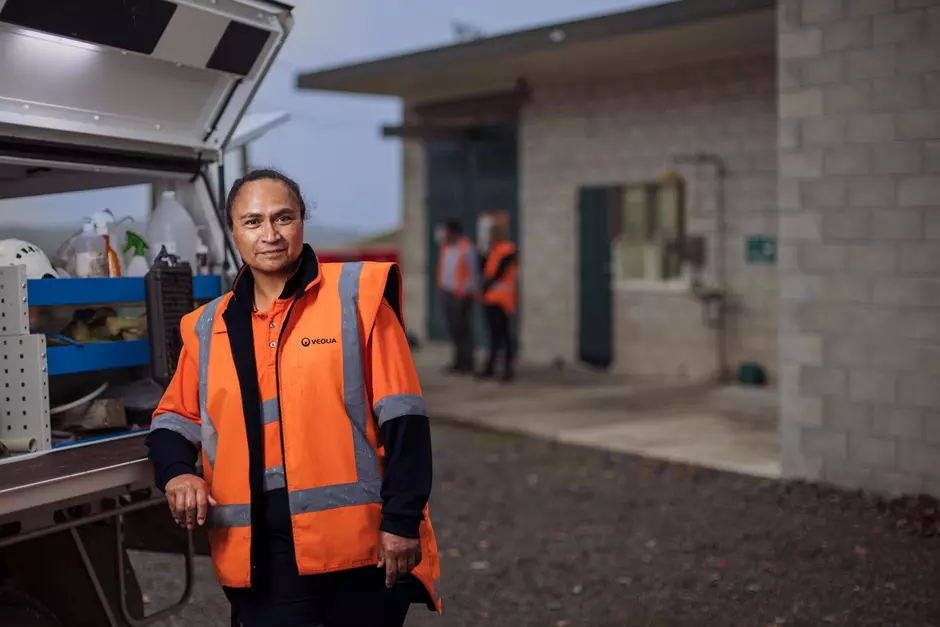OUR STORIES
Here are some of their stories and their thoughts on being ready to tackle some of the challenges we face as a nation to retain access to safe drinking water, to keep our environment free from pollution, and to provide solutions that support a prosperous and circular economy.
Contact our team in New Zealand
What does Ecological Transformation mean to you?
I really look forward to seeing some of the transformations that are coming – things like our Palmerston North project that is changing the way we use food waste. Initiatives like this will be a forerunner for other innovations. We humans are quite good at using resources without thinking much about them, and harming the planet sometimes unintentionally – it’s time we changed that and started taking a more proactive approach. We’re on a journey to fix things. But it takes individuals all working at it to make changes. It can’t be just a vision or a theory from a company. We, as individual people, need to also transform our ways. Every little step counts! Every individual needs to take a least one small step forward. It may not seem like much, but can you imagine if 10 people took one step forward? And then imagine if 100 people took one step forward. Soon, the footprint becomes bigger and bigger! I think we need to not only look at it through the big lens, but also through a smaller lens. Everyone can do something small, and it all matters. Just find something small and do it. If you see rubbish on the street, stop and pick it up. Take pride in your surroundings and set an example for other people, especially children, who see what you’re doing.
When you think of water, what comes to mind?
Water is life. We are connected to the land, but water nourishes the land, and brings power and life to the land. Everything is connected – all the organisms on earth are connected by water. Water carries all things good and bad from one place to another, whether that’s nourishment or toxins. Water helps us grow and thrive – people, plants and animals. It’s a conduit for life. Everything is sacred and water is the thing that connects it all.
What should customers be thinking about?
Water doesn’t initially look like the water that comes out of the tap. There is a lot that goes on to make it clean and safe for people to use. I would love for people to have a better understanding of what is involved in the processing of wastewater and the work involved in making our water available to use in the household. It’s a complicated journey that water takes. And we’re part of that journey, providing safe water for people. I’d like people to realise that it can take years for water to travel on its journey from the land to our homes. Water takes many pathways before it comes to us and we must respect it for what it is.
Describe a moment that made you proud working at Veolia
I’m so proud of the way we all worked together after the flooding [February 2023]. One of our major water treatment plants was down, and the second alternate plant was flooded. But we all pitched in and were able to get that one up and running in a day. It wasn’t just about getting the plant running; it was really about getting clean water back to the residents as quickly as possible. We had people at the plant around the clock, with some people sleeping there on-site to make sure everything was working. I don’t think many people realise that and how much dedication there was to getting water back to the community. I’m also proud of the community support that was shown. The help we got meant a lot when we were tired and working our hardest to help others.
Natalie Van Leeuwen
National Operations Manager - Central Hawkes Bay
“It’s up to us and other people in Three Waters to help share the knowledge.”
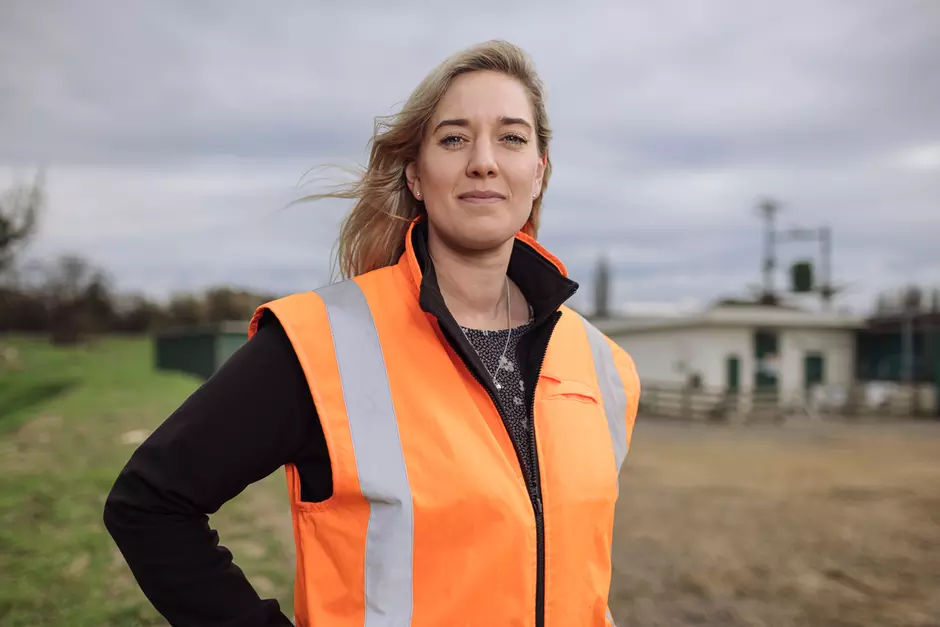
Tell us about a proud moment in this job.
Without a doubt, I'm immensely proud of how my team and everyone at Veolia here in Hawke's Bay pulled together after the floods. Our plants were down, we had people working 90-hour weeks, and we had staff members who didn't see their family members for a month. But we did what was needed to get safe drinking water back to the community as quickly as possible. People had lost their belongings, pets and homes, and yet they still made the effort to bring us cakes and beers to say thank you. They could see the effort we put in and they appreciated it. I'm proud that the work we do makes a real difference in people's lives.
How can Veolia work together with other industry leaders?
It's time we all do what we can to protect the land and its natural resources. Veolia is trying to make the world a better place – it's inspiring to see and be involved in the work the company is doing. It's up to us and other people in three waters to help share the knowledge. It's a great time for people in the industry to come together to learn from each other, to educate the public, and to attract more people to work in the sector. It's a great space to work in – we're doing incredible things and we're helping create better lives for people. We all have some good ideas of what we want the industry to look like, and we're all working toward similar outcomes. It's time to come together. Knowledge is power, and knowledge from other people is pretty cool.
What change do you think needs to happen to create a more robust and sustainable water supply for all New Zealanders?
At Veolia, we’re living the change we’re trying to make. I’m mindful of the water I use – we shouldn’t take more than we need. I know how my water use affects the wastewater system down the line. And I know that it’s a reality that water could run out. Everyone needs to get on board with this transformation journey. I think people need to have more visibility and education on what we at Veolia do and how it affects everyone. They need to see what we’re doing for the community.
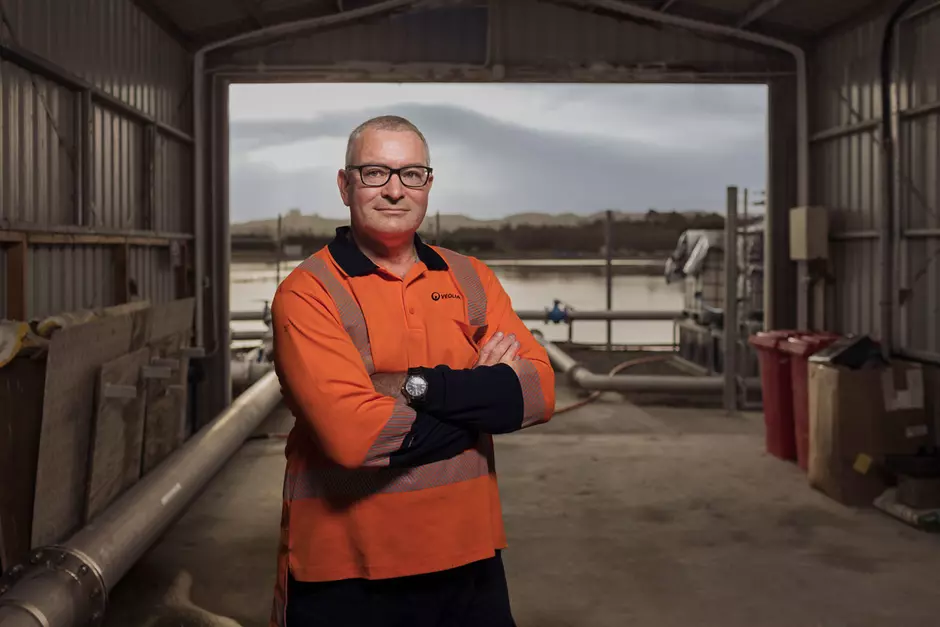
Ken Sanderson
Waste Water Technician - Central Hawkes Bay
“We’re already recovering food waste and turning it into fuel. Could we do the same with sludge?”
What does Ecological Transformation mean to you?
Protecting this precious resource is about changing not just behaviours, but also the way we think about things. My background is in food technology, so I’m fascinated by what we do with food waste and rubbish. It’s time we start looking at things differently. Instead of disposing of things that we don’t use, let’s start thinking about them as assets with undiscovered benefits. We’re already recovering food waste and turning it into fuel. Could we do the same with sludge? How great would it be if every part were thought of as an asset with a possible use? I used to think that wastewater treatment was about getting rid of waste – now I think of it as doing something with that waste. It starts with changing the way we think.
What does water mean to you?
In many ways, water is a personal compass for people. It’s often how we orient ourselves when we’re in a place, knowing which direction the water is in. Growing up in Wellington, I’d look out to the sea to predict what the day was going to be like. Now, as I cross two rivers on my way to work, I look at the colour of the water and that tells me what’s going on up in the hills. Water is a gauge for what’s happening around us. With a background in the wine industry, I understand the role that water plays in how we use our land and the types of foods we produce. To be fertile and productive, land needs irrigation. Rainfall and rivers and soil types dictate what we do with the land and what we produce. So it’s a compass and a tool we use to guide our lifestyles.
What do you like about working with Veolia?
The thing that’s different about a company like Veolia is that we’re driven from the ground up. Quite literally, in the work we do, but also in the culture. Our key stakeholders are the members of the communities we serve. We’re responsible for and responsible to the members of the community who need clean water to use and the safe removal of wastewater. We may be part of a large, global company, but on a day-to-day basis we’re thinking of locally. We’re visible out in the communities. Every day I think about how my actions at work support my personal goals. For me, that’s looking after our water, our rivers, our communities.
Nicky Hart
Retic Team Lead / Network Operator, Central Hawkes Bay
“We’re all in this together to make a difference.”
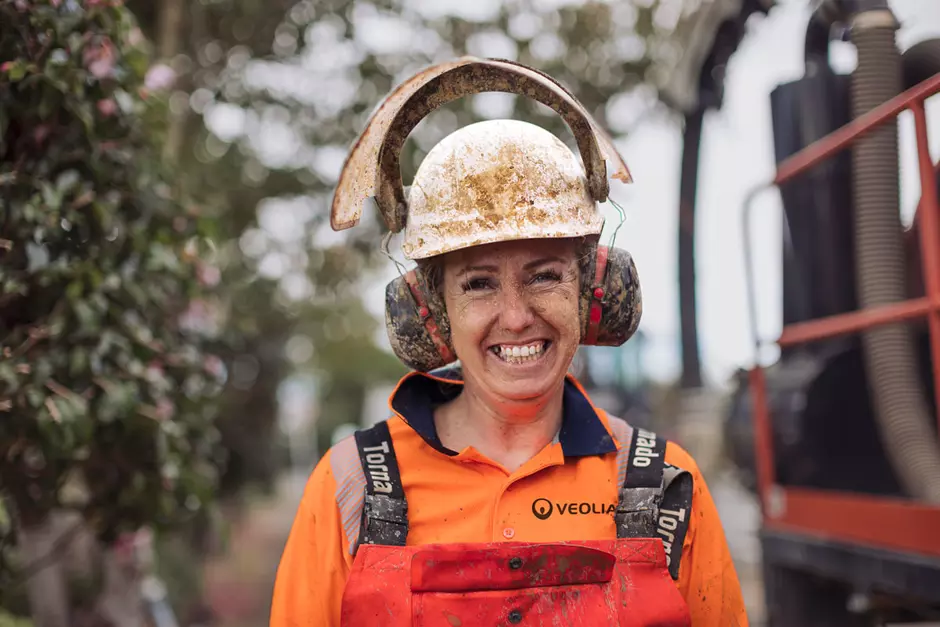
What does Ecological Transformation mean to you?
If I think about how the company's vision of ecological transformation translates into a personal vision for me, it comes down to changing behaviours. We know that transformation involves some sort of change over time. But what do we need to change? I think it's our behaviour, in three ways. We need to consider changing our social, environmental and biological behaviours. Transformation isn't a linear process; it involves all areas of our lives – how we use water, what we reuse and recycle, and what we purchase. It sounds corny, but it really is a circle of life. Working at Veolia, I'm now much more aware of the environmental factors around preserving water. Everything we do affects our water and waterways.
How can Veolia work together with other industry leaders?
Quite simply, great minds think alike. If all the companies in this sector brought forward their most informed people and they all got together, great change would happen. There are often multiple ways to address a problem, so when we come together, we are exposed to more ideas, more solutions – and usually, better ways of doing things. Working alongside other great people in our industry will help bring out the best ideas. We all have the same desired outcome. We call it ecological transformation. Others may call it something different. Working together, we can achieve it better and faster.
What should customers be thinking about?
We've all been given ways to change our water use – shorten our showers, turn off the taps when brushing teeth, and so on. But changing behaviour also extends to how we recycle and dispose of things. I would suggest people also take a look at what they're putting in the rubbish and the recycling stream. Sometimes it may take a little bit of extra effort to keep something out of the waste stream, but it's worth it. If there is a place you can take your used batteries or Tetra Pak boxes, then do that. The more we can keep out of our rubbish bins, the better. It all affects our waterways and our land.
What does water mean for you?
Here in New Zealand, many of us take it for granted that we have clean, safe drinking water. We turn on the tap and just expect to have water that is safe for drinking, cooking and showering. In actual fact, we rely on it for so much more. I think if we all stopped to think about just how reliant we are on water, we'd do more to preserve it. We need efficient water systems and waterways for a lot of our manufacturing and production – particularly food production and agriculture. Water really is a requirement for life. We all depend on it. We all need to preserve it.
What are you proud of in your role?
I'm really proud of everything I've accomplished so far in my two years with Veolia. I'm so appreciative that my manager recognised something in me when I was hired. To be honest, I wasn't sure if I could do the job, but I had the determination and the drive to learn. And now I lead a team. I feel really empowered to do that in this sector as a female. I love it when people yell out things like "girl power" as they drive by a site. It's great when members of the public give us positive feedback on the work we're doing. I'm incredibly proud of the work we do and I absolutely love my job. I'm part of an amazing team who all support each other and want to help one another. At Veolia, there is a strong focus on communication. We're all free to voice our opinions and we feel listened to. That's how change comes about. Someone has an idea or an opinion, and others are open to taking those ideas on board to make improvements. There's no hierarchy between people in the office and people out on-site, and no top-down culture from management. We're all in this together to make a difference.
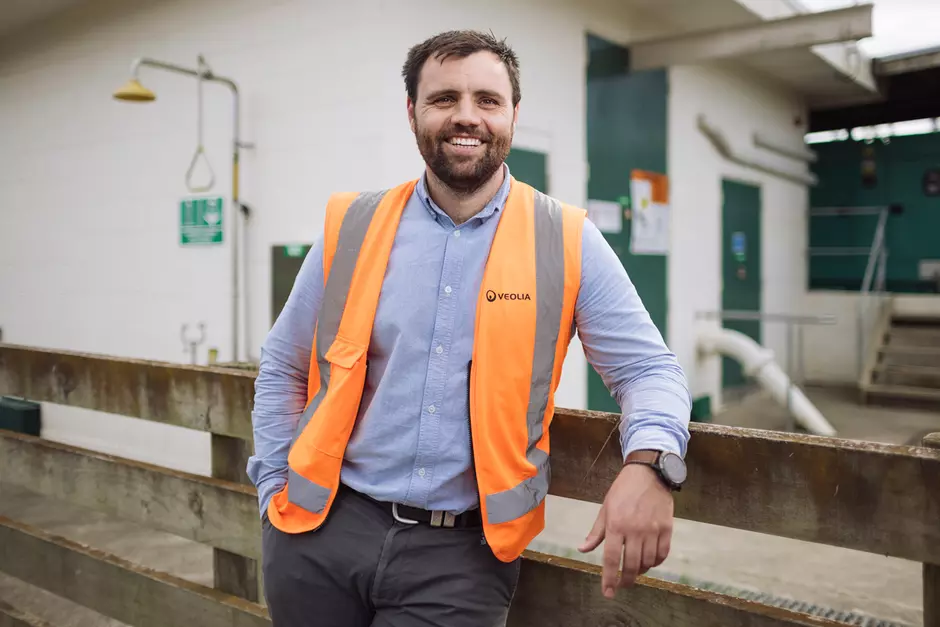
Sean Ritchie
Operations Engineer - Central Hawkes Bay
“Bringing clean water into people’s homes and taking their wastewater away –these are essential parts of keeping people healthy. It’s a great responsibility, and I’m proud to have it.”
What does water mean to you?
Water has been important in many ways at different stages of life for me. I was a lifeguard when I was younger, so I know how dangerous and powerful water can be. I also had a seven-year career in the Navy as a marine diesel mechanic, working on machinery that operated in and around water. So I gained a respect for water early on, and I have a unique appreciation for water all around us and how we use it. Now as an operations engineer, I have another role working with water. On paper, my role involves looking after our water and wastewater plants. In reality, though, my role has been likened to that of a health professional. Bringing clean water into people’s homes and taking their wastewater away – these are essential parts of keeping people healthy. It’s a great responsibility, and I’m proud to have it.
What should customers be thinking about?
A lot of our water infrastructure is not visible – most of our pipes and drains are underground. When you can’t see something, it’s out of sight, out of mind. I’d love people to have a better understanding of what goes on underground and away from their homes to bring clean, safe water to them – and to safely remove their waste and wastewater. I live on a lifestyle block where we harvest our rainwater and are very mindful of what does down our drains as that goes into our paddocks. We reuse, recycle and compost as much as possible. It would be great if people could see how it’s possible to minimise the amount of water used and wasted. If you were given a ration of ten litres of water to use per day, you would look after it, keep it clean, and not waste it.
How can Veolia work together with other industry leaders?
It’s important that we showcase the work we’re doing – not to make ourselves look good, but to inspire others and share innovations. We don’t want to keep innovation to ourselves. We want to share it so we can help bring others up to similar standards and lift the game for the entire industry. It reminds me of an earlier innovation. The engineer who invented the seatbelt left the patent open so other manufacturers could replicate it. The communal benefit was more important than any financial reward or accolade. The same is true for us. When other industry partners also do good work, we all benefit.
Dave Neru
National Operations Manager - Auckland
“Being the largest water company in the world, Veolia has the opportunity and the responsibility to advocate to decision-makers, and to educate our communities to ensure that they understand the precious taonga that water is.”
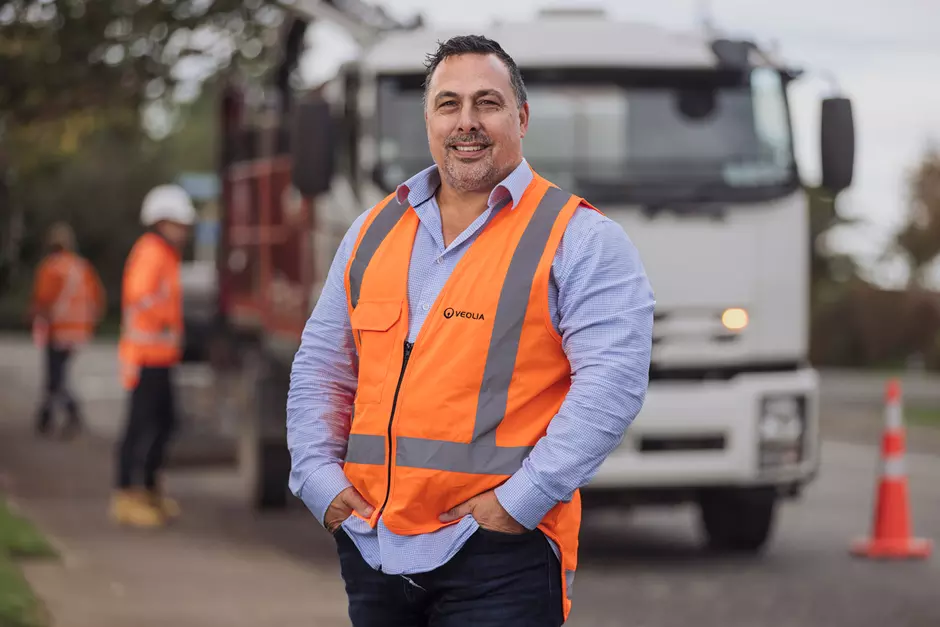
What does water mean to you?
The water industry is at the forefront of community health. We are the first line of defence against disease and have done more for humanity than any other industry, any wonder drug, medicine or miraculous chemical out there. When you think about it, it was the people in the water industry who stopped (in most part) the plague by providing safe drinking water to households and taking sewage product away from communities. One of the first things that happens during disasters, after rescuing people and providing medical treatment, is the provision of safe drinking water and a sanitary environment to sustain life and prevent the spread of disease. So we are community health workers. We’re also an environmental protection group. As an industry, we focus on two outcomes. We produce the safest drinking water that we can and we produce the best effluent quality that we can with what we have and what we know. We put wastewater back into the environment in a way that doesn’t have an adverse effect on people and the environment. These things are at the forefront of community and environmental health.
What change do you think needs to happen to create a more robust and sustainable water supply for all New Zealanders?
We need to start looking at outcomes and own the consequence of what we do today impacts the communities of the future. Let’s go back to the purpose of the water industry, and that is to produce the safest drinking water and the best effluent quality we can. We do this so that members of the community have the opportunity to live a prosperous life. We also help protect the environment so future generations can still use the waterways for recreation, supporting life and of course the harvesting of kai moana. What consequences will be borne by future generations? Are we going to leave our place in a better state or a worse state? Are our children and grandchildren going to have affordable water? Will they have the seas and streams to play in and to use, like we have? All of our decision-making – as individuals, as water service managers, as industry advocates, as employees – all our decisions, no matter who we are, have to be based on the impact on the future.
What is your favourite thing about working for Veolia New Zealand?
Being the largest water company in the world, Veolia has the opportunity and the responsibility to advocate to decision makers, and to educate our communities to ensure that they understand the precious taonga that water is. quote Our purpose is to keep our communities healthy for today and the future. My job is to advocate and educate – with the ultimate outcome of keeping our communities healthy and able to have prosperous livelihoods.
What does Ecological Transformation mean to you?
Ecological transformation for Veolia is about looking after and doing better for our communities with regard to water, waste and energy. When it comes to waste, we’re looking at how we can reuse and reemploy – how we can repurpose waste into energy. Instead of putting water back into the environment, can we use it for agriculture etc? These are the types of things we’re working on. All of this fits nicely into Te Mana o te Wai. Te Mana o te Wai is about looking at the wellness and the health of water, looking at its journey through the hydrological cycle and how we interrupt it and use it. The ecological transformation aspirations of Veolia match the cultural aspirations of Māori and New Zealand around water. There are natural synergies, and the timing couldn’t be more perfect to link the ecological transformation aspirations we have as an organisation and commitment to giving effect to Te Mana o te Wai along with the aspirations of the water industry to do better for communities of today and also for the future.
What should users be thinking about?
At Veolia we have a responsibility and an opportunity to educate. We need to look to the future – there hasn’t been enough focus on the future. Two key factors are going to put a strain on water availability – climate change and population growth. We need to anticipate what the future can bring and prepare for it. Along with the conservation message, we need to help communities understand more about the process of taking water out of a waterway and what impacts that has on the ecology of today and in future. We have lots of water around us and we have a lot of water that falls on us. But we can’t use all of it to sustain life. Every year we have to treat it more to use it, because of naturally occurring processes as well as the human activities that affect our water quality. This is about reminding our communities of the importance of water as a provider of life and of the taonga of water as the life giver. Without it we don’t exist.
How can we do better today for the future?
We have to change our mindset about what we’re doing, why we’re doing it and how we’re doing it. We know what our function is, but our purpose is more important than our function.



